If you are looking to build a custom enterprise CRM, you may have the following questions: What factors should I consider when building a CRM system? How do I ensure that existing tools and processes integrate seamlessly? What are the best practices for scalability and customization? In today’s competitive business environment, a well-designed CRM system can be the difference between success and failure.
The problem of finding the right CRM solution has plagued companies for years. Building a custom enterprise CRM has become essential as out-of-the-box solutions fall short of meeting specific business needs.
This article provides a comprehensive overview of the steps involved in creating a unique enterprise CRM solution. From pre-planning and gathering requirements to building and deploying, learn the key components and best practices. Also, learn how to integrate your custom CRM with existing products and processes to ensure a seamless transition and optimal productivity.
What is an Enterprise CRM System?
Enterprise CRM (Customer Relationship Management) is a type of software used to manage large, complex customer relationships. The software helps companies better manage customer data, foster customer loyalty, and increase sales. Enterprise CRM often includes features and functions such as sales force automation, customer care and support, marketing automation, analytics, and social CRM.
What Makes a Good Enterprise CRM?
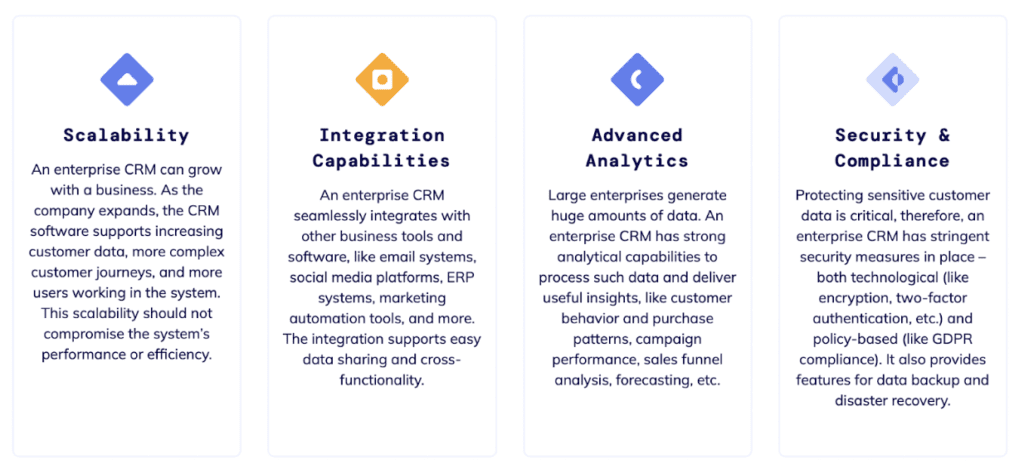
The best enterprise CRM software provides tools that enable customer-facing teams to operate at maximum efficiency. These tools help streamline daily operations so that everyone in your organization who interacts with customers can deliver a positive buying experience.
Good enterprise CRM software typically has the following features:
- To make it easier for employees to learn and adapt, the enterprise CRM should be easy to use and navigate.
- A quality enterprise CRM should be customizable to meet the specific needs of the organization.
- It should integrate seamlessly with existing systems, including email marketing tools, customer service software, and productivity tools.
- The ideal enterprise CRM should grow with your business, allowing you to increase the capacity to store and process data as your customer base grows.
- Team members need to be able to access and update customer information anytime, anywhere, especially on mobile devices.
- To support strategic planning and decision-making, an excellent enterprise CRM will provide robust data analysis capabilities. It must provide real-time data and reporting.
- With so much sensitive data, enterprise CRM systems require robust security, including data encryption, two-factor authentication, and user permissions.
- Reliable customer support from software vendors is essential for answering questions, providing training, and troubleshooting.
- Enterprise CRM software should have automation capabilities to streamline day-to-day tasks, free up staff time, and ensure that nothing is left undone.
- Enterprise CRM software should handle large amounts of data and provide easy-to-use tools for managing and cleansing data.

Benefits of Enterprise CRM System
Benefit #1 Customer Information Management
Enterprise CRM systems are powerful tools for companies that can collect significant amounts of customer data. This data can include purchase history, detailed communication logs, personal information such as preferences, and more. These systems provide a comprehensive, 360-degree view of customers. Beyond simply collecting data, these systems can help analyze and categorize the data, enable personalized marketing strategies, streamline customer interactions, and improve customer service. Ultimately, they serve as a critical resource for enhancing customer relationships and driving business growth.
Benefit #2 Improved Customer Service
Enterprise CRM systems give companies quick access to a wealth of customer data, such as purchase history, personal preferences, and previous interactions. Having this information at their fingertips makes it easier to personalize customer service. This personalization, in turn, enables companies to respond more quickly and accurately to customer concerns, requests, or problems. In addition, these systems enable companies to anticipate customer needs and gradually adapt their services or products accordingly. As a result, this anticipatory approach can lead to increased customer satisfaction and loyalty.
Benefit #3 Sales Force Automation
Enterprise CRM systems offer the ability to automate mundane tasks such as data entry, order management, and follow-up. This automation frees sales teams from operational routines, allowing them more time to focus on core sales activities. It also reduces the errors often associated with manual processes, while significantly improving overall productivity and efficiency. Ultimately, these systems free up time for sales teams to invest in developing effective sales strategies and fostering meaningful customer relationships.
Benefit #4 Marketing Automation
Enterprise CRM systems not only streamline sales but also revolutionize marketing processes by providing automation capabilities. You can efficiently manage marketing campaigns, track email marketing activities, and simplify lead generation processes. This reduces manual effort and increases the effectiveness of marketing teams. In addition, these systems can provide insight into campaign performance and customer behavior patterns, enabling data-driven decisions that lead to more successful marketing initiatives.
Benefit #5 Data Analysis & Reporting
Enterprise CRM systems can analyze customer data to generate valuable insights that help companies make informed decisions about marketing strategies, product development, and more. In addition, advanced reporting capabilities can present this data in an easy-to-understand and actionable format.
Benefit #6 Improved Collaboration
Enterprise CRM systems foster greater interaction and collaboration across business units by serving as a central hub for customer information. With a shared customer database, teams from sales and marketing to customer service and operations can access and update critical data. This connected flow of information facilitates better decision-making, reduces errors and duplication, and ensures a seamless, consistent customer experience. It also helps streamline business processes, resulting in greater efficiency and effectiveness in achieving core business objectives.
Benefit #7 Customer Retention & Loyalty
Enterprise CRM systems typically come with advanced customer engagement and retention capabilities, such as the ability to manage loyalty programs, customize offers, and conduct customer satisfaction surveys. These built-in tools can play a critical role in attracting and retaining existing customers. Personalized experiences can be created using customer data stored in the CRM, increasing the likelihood of repeat business. These features also allow companies to gather feedback and quickly address any issues, resulting in increased customer satisfaction critical factor in fostering long-term customer relationships.
Benefit #8 Scalability
An effective enterprise CRM system can scale as your business grows. Its flexible architecture can seamlessly accommodate an increasing number of customers, ensuring that your expanding customer base continues to receive exceptional service. The robust and adaptable functionality of these systems can manage and process increasing amounts of customer data. This ensures that no matter the size or scope of your business, you are well-equipped to meet evolving demands, maintain operational efficiency, and remain competitive in the marketplace.
Benefit # 9 Cost Saving
Enterprise CRM systems provide cost-effective solutions for businesses by automating various processes, resulting in improved operational efficiency. Automation eliminates manual tasks, streamlines workflows, saves valuable time, and reduces the risk of errors. As a result, these efficiencies can directly contribute to cost reduction and increased profitability. They also provide access to detailed customer data, enabling companies to develop targeted marketing strategies, reduce wasted advertising dollars, and increase conversion rates, further improving profit margins.
Building Custom Enterprise CRM – Step-by-step Guide
Enterprise CRM systems are designed to bring together information about customers across multiple channels – or touch points – between the customer and the company. These can include the company’s website, phone, live chat, direct mail, marketing materials, and social media. More and more companies are realizing the benefits of a robust and efficient CRM system, and as a result, many are considering building their own custom enterprise CRM. In this guide, we aim to outline the various steps involved in creating your custom enterprise CRM system. CRM development is no different from the development of a regular application, so it should follow SDLC principles:
1. Establish your Unique Needs and Goals
All organizations have unique needs and objectives that a CRM system should meet. It’s important to identify your business goals, core operations, and the specific business units (such as sales, customer service, or marketing) that could benefit from your customized enterprise CRM.
2. Pick the Right Type of CRM System
There are three types of CRM: Operational CRM automated marketing, sales, and service; Analytical CRM uses customer data analysis to improve business relationships; and Collaborative CRM improves the way a company communicates with its customers. Evaluate your needs and choose the right system or combination of systems.
3. Choose or Create a Framework
For many organizations, the prospect of building a custom CRM from scratch can be daunting. You can dramatically streamline your development process by using a CRM framework (such as Laravel CRM). Such a framework provides a basic structure that you can customize.
4. Determine your Data Storage System
Data is a critical part of CRM. That means you have to decide where and how to store it. The most effective approach to managing data in a CRM system is to use cloud-based storage, which provides instant access to data, improves collaboration, and strengthens data protection.
5. Do Not Ignore Security
As you develop your CRM, ensuring a secure system is paramount. Data encryption, strong user authentication, access control methods, and regular security audits are just some of the basic security measures you need to incorporate. If you’re not fully cloud-based, it also helps to stay up to date with the latest security protocols and regulations, use firewalls, and secure physical servers. In the event of an unexpected data loss, having a disaster recovery plan in place can provide an extra layer of security.
6. Design an Intuitive User Interface
The importance of good UI/UX design in making your CRM system easy to use and effective cannot be overstated. An effective CRM system should be easy to use, easy to navigate, and easy to understand. Involving actual users in the design process can provide valuable insights. Also, be sure to design responsively for a consistent experience across devices. To speed up the onboarding process for new users, provide on-demand help or tutorials within the CRM.
7. Choose Features Wisely
From email tracking and social media integration to task management and analytics, there are many features you can add to your CRM system. However, an overload of features can lead to confusion and decreased usage. That’s why it’s wise to choose features that are closely tied to your business goals and needs. It also promotes efficiency and productivity by investing in a thorough training process for your team members to use the system effectively. Updating and maintaining the software in the middle of the night can also help avoid disrupting workflow during active business hours.
8. Testing and Feedback
You need to go through several stages of testing to resolve any bugs or performance issues before integrating your custom CRM into your operational ecosystem. Once implemented, the ability to gather valuable user feedback is essential for continuous improvement. Extensive training of your employees is also essential so they can use the CRM effectively.
Building Custom Enterprise CRM Solution on Flatlogic Platform
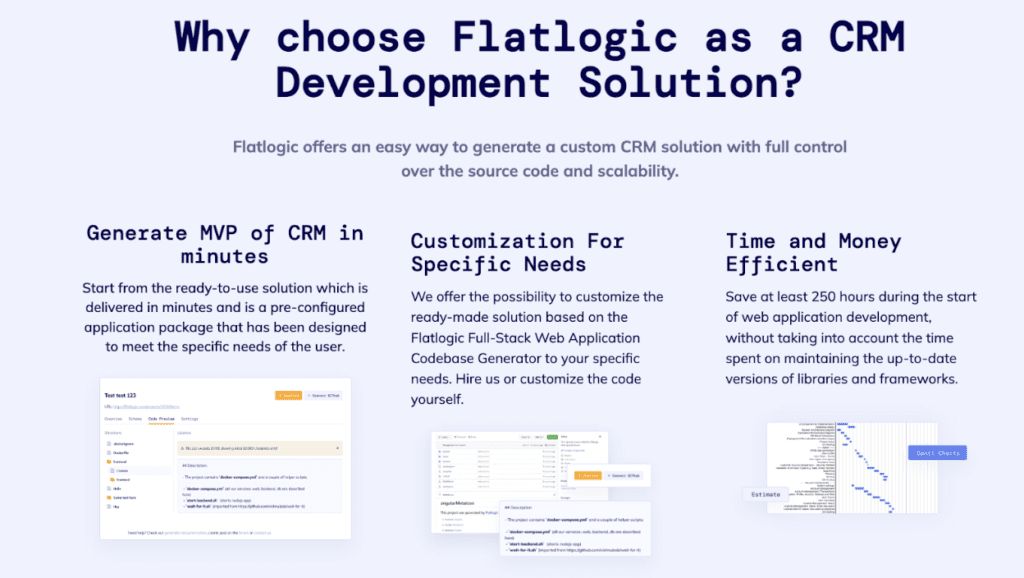
Flatlogic is a best-of-breed platform that provides companies with customized CRM solutions. Its high flexibility allows companies to tailor CRM to their needs, resulting in more efficient processes and improved customer relationships. Ensuring robust security measures to protect customer data is of utmost importance to us at Flatlogic. In addition, Flatlogic strives to provide a comprehensive set of integration options that enable seamless connection to existing business systems. Scalable and easy to use, with a range of templates to get you up and running quickly, Flatlogic’s CRM solutions are built to last. They are a trusted choice for companies looking to optimize their customer relationship management because of their cost-effective approach and quality customer support.
Benefits of Flatlogic Platform
- Increases efficiency and effectiveness by allowing you to fully customize your CRM software based on your company’s unique needs.
- Ensures a seamless and comprehensive customer management system by integrating with various business tools, software, and applications.
- Let your CRM grow with your business. Our scalability allows us to handle increasing data volumes and user loads while maintaining consistent performance.
- Flatlogic’s focus on strong data protection measures gives you peace of mind about the security of your information.
- Flatlogic is more affordable than many pre-packaged CRM systems because you only pay for what you need.
- To ensure a smooth journey in building and implementing your CRM solution, Flatlogic provides high-quality, responsive support.
Features offered by the Flatlogic Platform
- Customize your business process by adding or removing any field or module.
- Streamline processes and increase productivity by automating routine tasks.
- Use advanced search and filtering to quickly find the information you need.
- Make informed business decisions by accessing detailed analytics and creating insightful reports.
- Encourage teamwork and collaboration within your organization with collaborative features such as shared views and task assignments.
- Manage and easily track all tasks and activities in your CRM.
- Start from scratch or choose from a variety of robust templates.
How to Build Custom Enterprise CRM – Flatlogic Guideline
Using the Flatlogic Full-Stack Generator you can create CRUD and static applications in a few minutes. To start using the Platform, you need to register on the Flatlogic website. Clicking the “Sign in” button in the header will allow you to register for a Flatlogic account.
Step 1. Choosing the Tech Stack
In this step, you’re setting the name of your application and choosing the stack: Frontend, Backend, and Database.
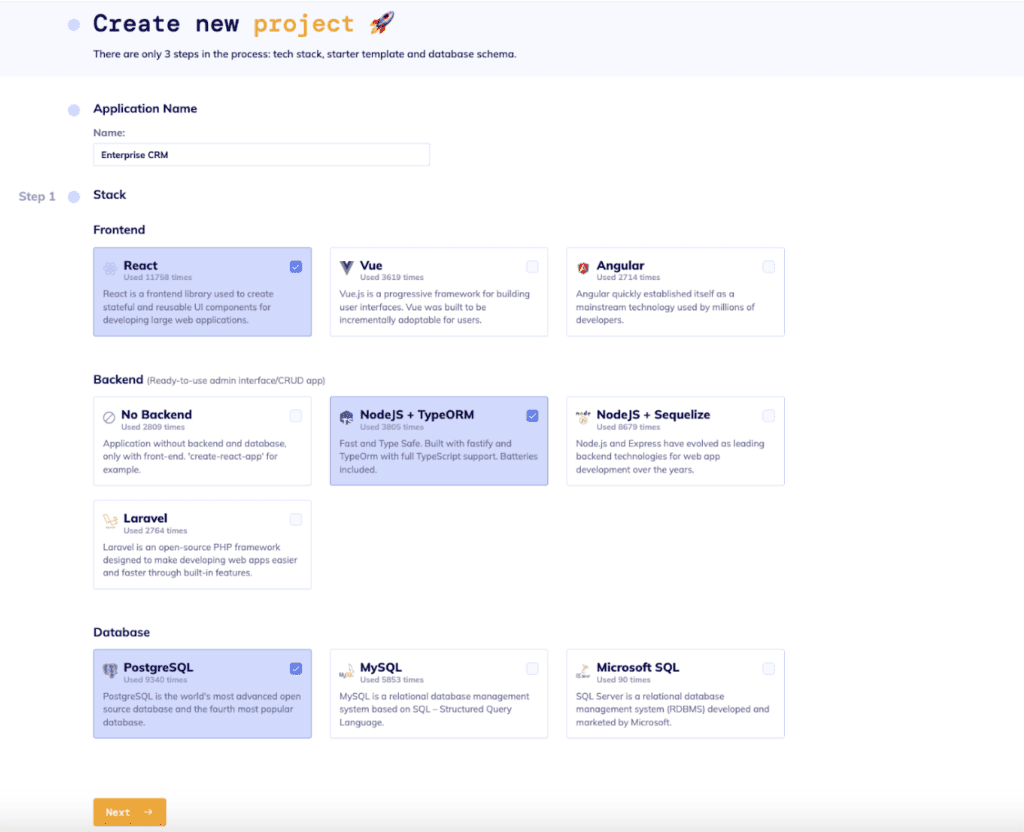
Step 2. Choosing the Starter Template
In this step, you’re choosing the design of the web app.
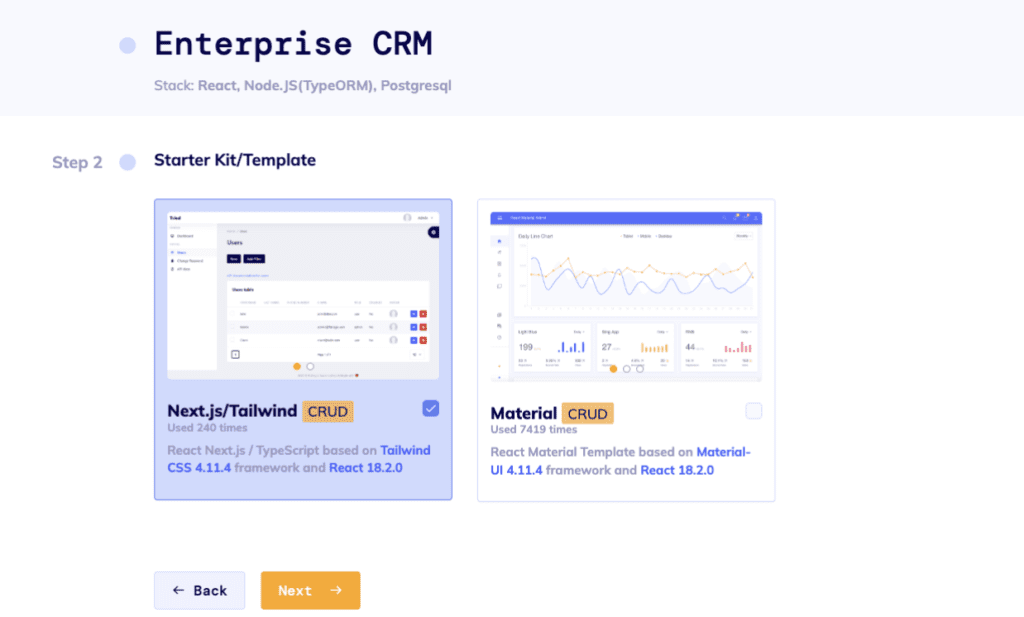
Step 3. Schema Editor
In this step, you can create your database schema from scratch, import an existing schema, or select one of the suggested schemas.
To import your existing database, click the Import SQL button and select your .sql file. After that, your database will be opened in the Schema Editor where you can further edit your data (add/edit/delete entities).
Suppose you are not familiar with database design and find it difficult to understand what tables are. In that case, we have prepared some ready-made sample schemas of real applications that you can modify for your application:
- E-commerce app;
- Time tracking app;
- Book store;
- Chat (messaging) app;
- Blog.
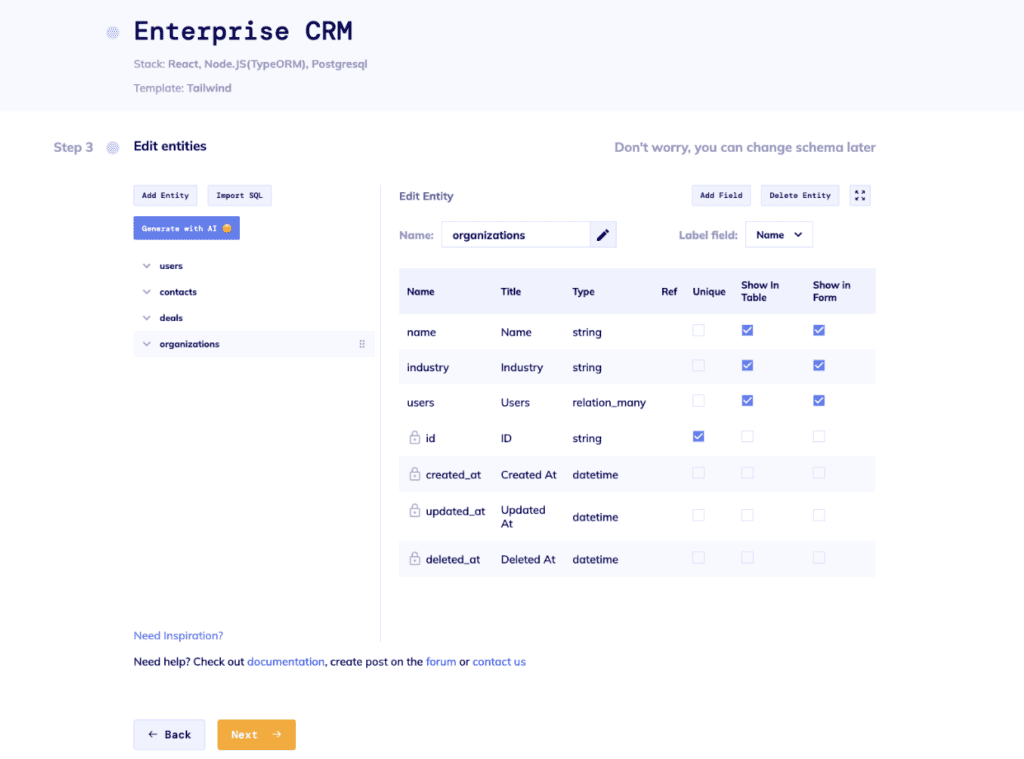
Or, you can define a database schema and add a description by clicking on the “Generate with AI” button. You need to type the application’s description in the text area and hit “Send”. The application’s schema will be ready in around 15 seconds. You may either hit deploy immediately or review the structure to make manual adjustments.
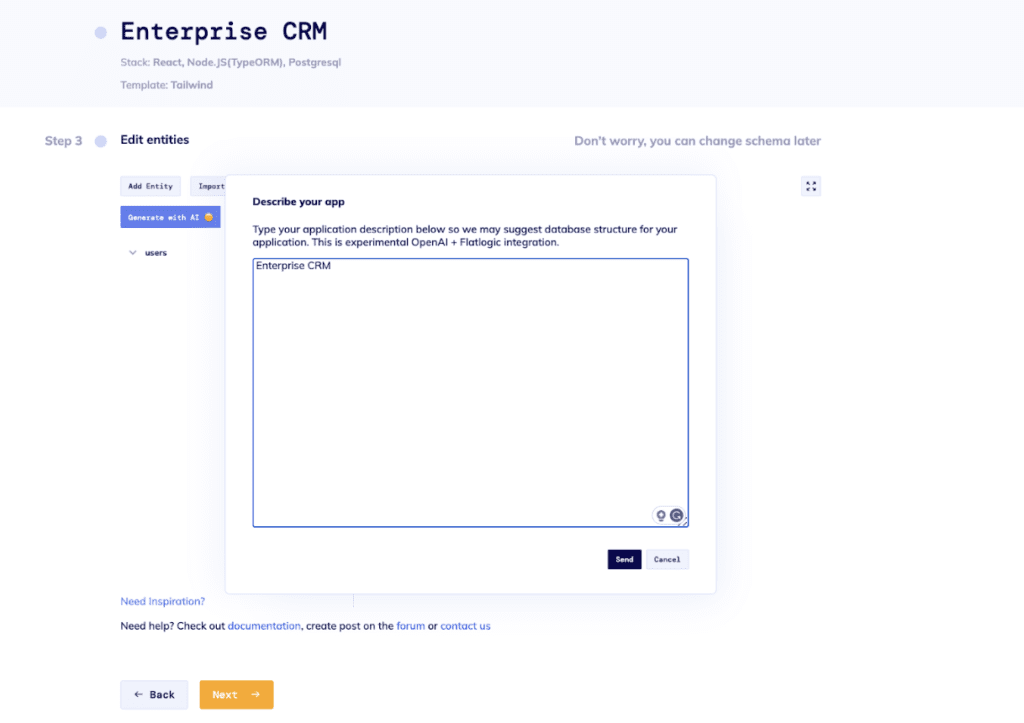
Next, you can connect your GitHub and push your application code there. Or skip this step by clicking the Finish and Deploy button and in a few minutes, your application will be generated.
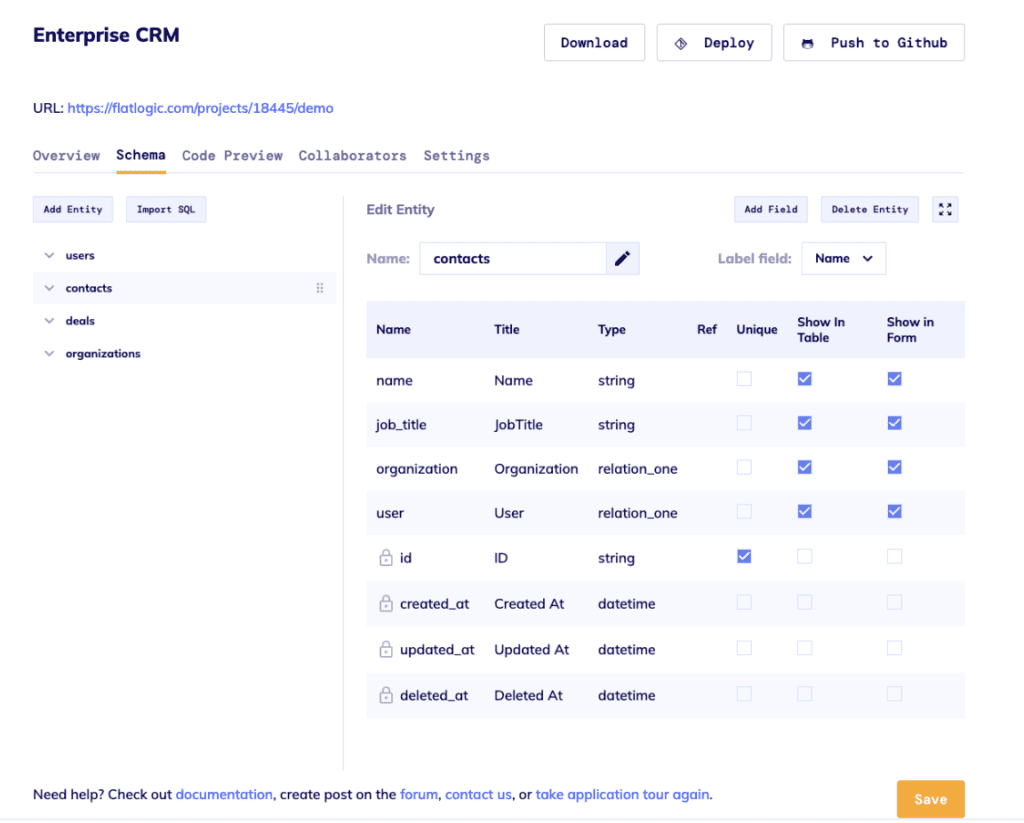
After that, you will be able to modify the code of your application to meet your specific needs, or you can contact us for help.
Summing Up
In summary, building your custom enterprise CRM can be a time-consuming process, but with strategic planning and execution, it can dramatically increase your company’s productivity and customer satisfaction. Be patient and remember to iterate until you have a CRM system that works well for your unique business needs.
Creating a custom CRM for your business is not just a system, it is a tangible asset that will help you increase sales, improve customer retention, and streamline your business operations. It’s a journey that turns data into relationships, and relationships into ROI.
Why is Flatlogic the best choice for building custom Enterprise CRM Software?
- Cost Efficiency. Compared to building a CRM from scratch, the Flatlogic platform provides a cost-effective way to build robust CRM systems.
- Speed. Deployment time is significantly reduced through the use of customizable templates.
- Technical support. In case of problems, Flatlogic provides technical support.
- Future proof. The platform scales and adapts to future changes in organizational needs and technology advancements.
By leveraging the full potential of our enterprise CRM solution, organizations can significantly improve operational efficiency, customer satisfaction, and overall service. The effectiveness and efficiency of business operations can be dramatically improved by deploying a personalized enterprise CRM solution.
Comments